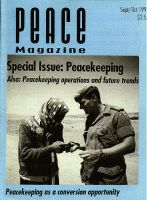
Peace Magazine Sep-Oct 1993, page 29. Some rights reserved.
Search for other articles by Nola Dippenaar here
South Africa is in transition from a minority white government to a black-dominated multi-racial government to be elected in April, 1994 Amid all this change, how does a white 42-year-old mother of three young children feel?
So many wonderful things have happened in the last few years that were unthinkable just ten years ago! Our press is freer than it has ever been; our television coverage of daily events is better than ever before; politicians have to answer for their actions and participate in television debates, and there are no longer restrictions based on race. The general feeling among non-politicians of all races, who now mix freely, is positive. We all love this beautiful country and its sunshine, and we want to build a new South Africa together.
The only road to this end is through the multi-party negotiations currently taking place. The most amazing sight on TV is leaders of many parties sitting in Johannesburg, debating and reaching consensus on vital issues. Just two years ago, I would have considered such consensus wishful thinking. The ideologies vary widely from Communism and Socialism to carving South Africa up into tiny enclaves for minority groups; yet the fact that the groups are talking is miraculous and fills me with hope.
Of concern, however, is the continued violence from small extremist white right-wing and black left-wing parties, neither of which wants multi-party negotiations or is willing to compromise. There is rivalry between ethnic groups. Political parties use unemployed and militant youth to their own ends. Jobs are scarce and unemployment is high, exacerbated by sanctions and the world-wide recession.
When violence and looting break out during protest meetings, the initiators are usually uneducated, undisciplined youths who are easily mobilized and have nothing to lose. They are members of the "lost generation." Regular school boycotts over the last ten years have been the norm. Parents are literally afraid of their own children.
As political parties gear up for the 1994 election false promises are being made. The unrealistic expectations created in the black majority can never be met by any government. In the end, economics will dictate what is possible. Our productivity is low and workers are continually striking for more money, while doing less. Unless our economy grows,
providing jobs and education for black children, I shudder to think what could happen.
South Africans worry about how the new government will tackle these problems. An open, free, strong Western-style economy is the only way to meet social needs. I look around Africa and do not see a single viable economy. I hope and pray that it will be different here, but I worry about my children's future. Will educational standards fall, and will they face discrimination, as black children do? Will South Africa become a Third World one-party government. And yet we find hope. People of all races are working together as peace monitors and negotiators in areas of unrest. Sanctions will soon end, and investors are again showing interest in this country. Our multi-racial government will be a first for Africa.
South Africa can become the powerhouse and food basket of Africa, if sense prevails, and if all South Africans work together.
Nola Dippenaar is a political scientist in South Africa.

Peace Magazine Sep-Oct 1993, page 29. Some rights reserved.
Search for other articles by Nola Dippenaar here